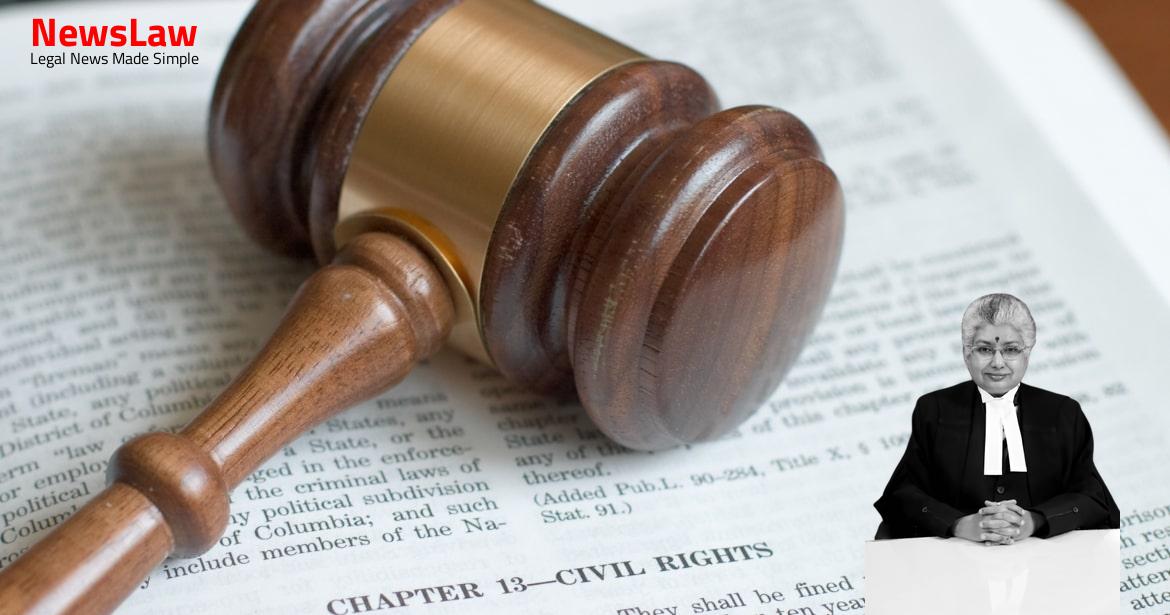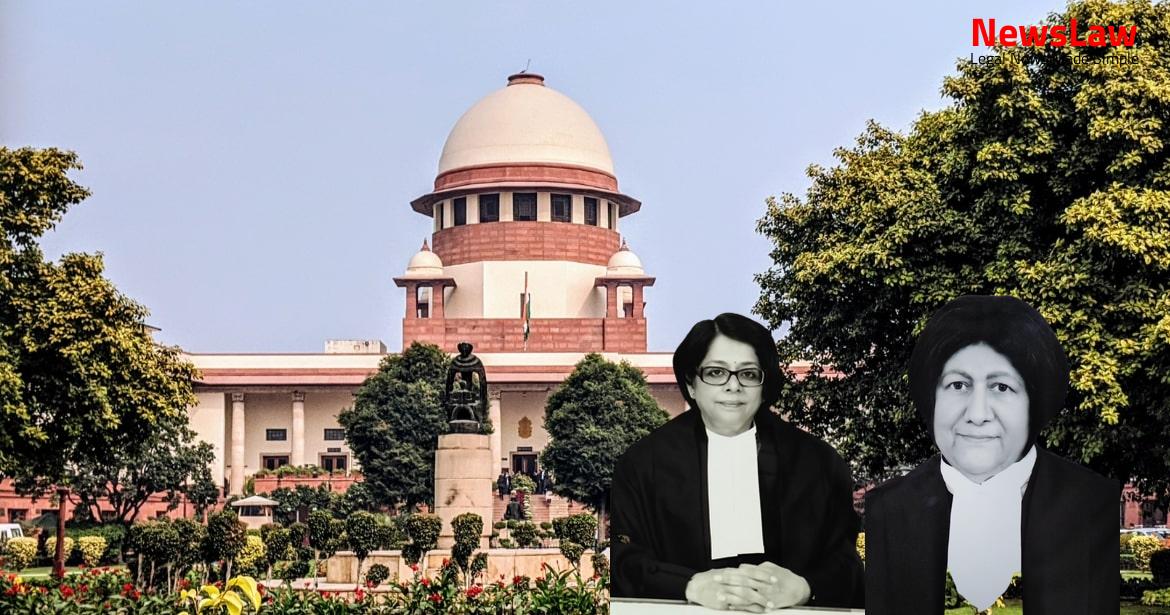In a landmark decision by the Supreme Court, the validity of the Development Agreement dated 10th March 2003 has been upheld. The Court’s ruling has far-reaching implications for the parties involved in this case. Read on for a detailed overview of the judgement and its impact on the legal landscape. #SupremeCourt #LegalJudgement #ArbitrationAct
Facts
- The appellant was appointed as the developer by the society in 1999.
- M/s. Aurora was initially appointed as the property developer to implement a slum rehabilitation scheme.
- An agreement was executed in 2003 between the appellant and the respondent for construction activities and FSI allotment.
- The appellant claimed that the respondent took over construction activities due to M/s. Aurora’s failure.
- Various agreements and deeds were executed between the parties regarding construction and area allotment.
- There was a dispute initiated by the respondent in 2012 regarding defaults by the appellant.
- The Arbitral Tribunal passed an award in favor of the appellant, rejecting the respondent’s claims and counter-claims.
- The High Court judgment dated 7 July 2023 is being appealed by both parties in cross-appeals.
- The Division Bench of the High Court remanded the case to the Single Judge citing several issues that were not considered.
- The Single Judge found that specific performance in the case would be affected by Section 14 of the Specific Relief Act, 1963.
- The Single Judge noted that the respondent did not prove readiness and willingness to perform obligations.
- The Single Judge held that the Arbitral Tribunal only referred to a part of witness depositions, ignoring the rest.
- The Single Judge clarified that the Award did not cover specific flats mentioned in injunction orders by the Bombay High Court.
- The Single Judge set aside the Arbitral Award on grounds like perversity and patent illegality, rejecting the bias allegation against the Arbitrator.
- The Single Judge found discrepancies in the per square feet rates of flats to award damages.
- The Single Judge stated that delay in completing other projects by the appellant was not a valid ground for specific performance relief.
- The Single Judge mentioned that relying on material not part of the record breaches natural justice principles.
- The Single Judge held that the Arbitral Tribunal exceeded its jurisdiction and specific reliefs should not have been granted.
- The Single Judge said conduct of the respondent should have been considered before granting relief of specific performance.
- The Single Judge discussed damages awarded for alleged delays and noted certain buyers were not part of the proceedings.
- The Single Judge also pointed out that flats under sale agreements were mortgaged to Banks and Financial Institutions.
- The Single Judge mentioned that Banks and Financial Institutions would be impacted by the Tribunal’s finding on sale agreements.
- The Single Judge ruled that direction to create a charge was beyond jurisdiction.
- The Single Judge analyzed various reliefs granted by the Arbitral Tribunal and their execution requirements.
- The Single Judge observed that permissions were ordered from entities not party to the arbitration proceedings.
- The Single Judge critiqued specific performance claim based on Letter of Intent from 2010 instead of 2012.
- The Single Judge scrutinized the Arbitral Tribunal’s approach in various aspects of the case.
- The Single Judge found fallacies in the Tribunal’s conclusions regarding building capacity and other directives.
- The Single Judge questioned the Tribunal’s authority to supervise specific actions like shifting PAPs in alternate properties.
- The Single Judge observed that the buyers of the 31 flats were not party to the arbitration agreement.
- The Single Judge mentioned a charge over appellant’s flats as per arbitral award.
- The Single Judge criticized the Arbitrator for using different standards for evidence from both parties.
- The Single Judge objected to reliance on a news report by the Arbitrator.
- The Single Judge highlighted overlooking of evidence while granting damages and interest payments.
- The Single Judge concluded that the Arbitral Tribunal showed inequality towards parties in the case.
Also Read: Judgment on Interim Stay of Bail Orders: The Case of Liberty vs. Judicial Discretion
Issue
- Based on submissions made across the Bar, the issue revolves around the power of the Appellate Court dealing with the appeal under Section 37(1)(c) of the Arbitration Act to pass an order of remand to the Section 34 Court.
- The central focus is on the authority of the Appellate Court in such situations.
- The power of the Appellate Court to remand to the Section 34 Court is a key aspect under consideration.
- Understanding the jurisdiction and boundaries of the Appellate Court is crucial in resolving this issue.
Also Read: Zaveri & Co. Pvt. Ltd. vs. ACIL: Legal Precedent on Guarantor Liability
Arguments
- Learned Single Judge dealt with all issues in detail while allowing the petition under Section 34 of the Arbitration Act.
- Directions issued required continuous court supervision.
- Narrow scope of interference in appeal under Section 37(1)(c) compared to Section 34.
- Appeal under Section 37(1)(c) cannot remand the petition for fresh hearing.
- Provisions of Order XLI of CPC regarding remand do not apply to appeals under Section 37 of the Arbitration Act.
- Appeal under Section 37 is considered a continuation of the proceedings under Section 34.
- Intervenor before Division Bench in appeal under Section 37 of Arbitration Act has filed Civil Appeal from Special Leave Petition.
- Plea by Respondent is for restoration of Arbitral Tribunal’s award.
- Submission is that remand order is unwarranted and Division Bench should have decided the appeal on merits.
- Claimant Samir Narain Bhojwani has also filed Civil Appeal from Special Leave Petition.
- Pointing out findings recorded by Division Bench in impugned judgment, it is argued that the reasons given by the Single Judge are elaborate.
Also Read: The Disputed Quarrel: Legal Analysis of the Case Involving Muthu and Kesavan
Analysis
- The disposal of petitions under Section 34 of the Arbitration Act should not be made without considering merits.
- It is crucial to ensure that notice is properly served to the respondent to avoid interference with the award.
- The interference in petitions under Sections 34 and 37 should align with the narrow scope prescribed by the Arbitration Act.
- A detailed analysis of the award is necessary to determine if it suffers from perversity or needs intervention.
- Courts should exercise caution and conservatism in dealing with arbitral awards and confine themselves to grounds strictly available under Section 34 of the Arbitration Act.
- The jurisdiction of the Appellate Court under Section 37 against a Section 34 judgment is more constrained than the Section 34 Court.
- The ultimate function of the Appellate Court under Section 37 is to ensure the proper exercise of jurisdiction under Section 34.
- Orders of remand should only be made in exceptional cases where unavoidable to prevent unnecessary delays.
- The time and resources of the Courts are valuable, and proceedings must be cost-effective and efficient.
- Arbitration proceedings should not become synonymous with lengthy and time-consuming processes, hindering the efficiency of the system.
- Courts must refrain from routinely passing orders of remand in appeals under Section 37 to maintain the efficiency and cost-effectiveness of the arbitral procedure.
- The Court’s supervisory role in arbitration is restricted, and decisions should be based on the grounds available in law.
- Proper consideration and analysis of the arbitral award are crucial before passing judgments or orders of remand in appeals under Section 37.
- Violation of Indian public policy includes violation of fundamental policy of Indian law, interest of India, conflict with justice or morality, and patent illegality in the arbitral award.
- Fundamental policy of Indian law covers compliance with statutes, judicial precedents, judicial approach, principles of natural justice, and Wednesbury reasonableness.
- Patent illegality means contravention of substantive law of India, contravention of the 1996 Act, and contravention of the terms of the contract.
- Jurisdiction under Section 37 of the Act clarified by the Court is similar to the jurisdiction under Section 34 of the Act.
- Interference with an order under Section 34 cannot exceed the restrictions laid down under Section 34.
- Jurisdiction under Section 34 of the Arbitration Act is narrow, and the scope of appeal under Section 37 is even more circumscribed.
- Court cannot undertake an independent assessment of the merits of the award under Section 37, must ensure that the scope of interference under Section 34 has not been exceeded.
- Concurrent findings confirming an arbitral award by both the court under Section 34 and the court in an appeal under Section 37 should be approached cautiously and not disturbed easily.
- The main objectives of the Bill are comprehensive coverage of international commercial arbitration and conciliation as well as domestic arbitration and conciliation.
- Provision for a fair, efficient arbitral procedure that meets the needs of the specific arbitration.
- Requirement for the arbitral tribunal to provide reasons for its arbitral award.
- Ensuring the arbitral tribunal remains within its jurisdiction.
- Minimization of the supervisory role of courts in the arbitral process.
- Introduction of the Arbitration and Conciliation (Amendment) Bill, 2015 to replace the previous ordinance.
- Amendment of the definition of ‘Court’ for international commercial arbitrations to involve the High Court.
- Granting Indian Courts jurisdiction to provide interim measures even in cases where the arbitral seat is outside India.
- Expedited disposal of applications for appointment of arbitrators within sixty days by the High Court or Supreme Court.
- Examination of the existence of a prima facie arbitration agreement when considering appointment of arbitrator, without being concerned with other issues.
- Members of the Bar should show restraint in petitions under Section 34 and appeals under Section 37 by incorporating only legally permissible grounds.
- Brevity in arbitral proceedings and proceedings under Sections 34 and 37 will make them more effective.
- Arbitration should be a tool for expeditious, effective, and cost-effective dispute resolution as per the UNCITRAL model.
- Stakeholders must introspect to improve the efficiency and fairness of the arbitral procedure.
Decision
- The Development Agreement dated 10th March 2003 is declared valid and binding.
- Claimant entitled to retain possession of specified flats until Respondent complies with directions in the award.
- Respondent directed to construct and handover PAP tenements to SRA.
- Claims for other reliefs not granted in the award are rejected.
- Respondent to pay compensation for delays in obtaining CC for Wing C.
- Respondent directed to remove encroachments from a specified road.
- Agreements for Sale of flats in Wing A to Managing Director and Directors declared as null and void.
- Specific actions and payments to be made by Respondent within specified time frames.
- Orders given regarding issuance of further CC and OC for Wing C.
- Prohibitions on sale or disposal of specific flats until certain conditions are met.
Case Title: BOMBAY SLUM REDEVELOPMENT CORPORATION PRIVATE LIMITED Vs. SAMIR NARAIN BHOJWANI (2024 INSC 478)
Case Number: C.A. No.-007247-007247 – 2024



